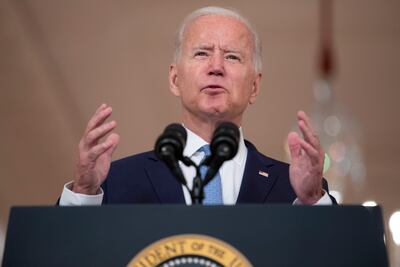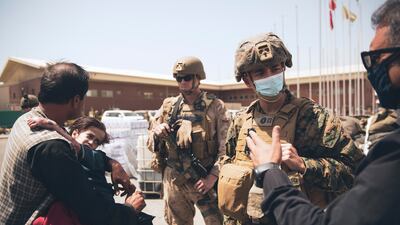When President Joe Biden called on policymakers to “learn from our mistakes” after the fall of Kabul and promised an “end to forever wars”, he captured a strong desire among many for the US to adopt a backseat role in matters of foreign intervention.
Denise Natali, acting director of the US Institute for National Strategic Studies told a panel of regional experts on Middle East policy that Americans had changed.
“We now have domestic concerns that we're focusing on and we do not have the domestic support for engagement today as we did 20 years ago,” she said.
"So where we had the war on terror and large levels of engagement, we have now calls for greater restraint."
The approaching 20th anniversary of the September 11 attacks has seen policymakers and analysts assessing the impact the events have had on the world.
In the Middle East, the shockwaves from 9/11 and America’s ensuing “war on terror” have reverberated in the two decades since, but the discussion hosted by think-tank Chatham House also heard that a more significant anniversary was that of the first Iraq war.

“I think that was more important in terms of world historical events than 9/11 itself,” said Gilbert Achcar, professor of Development Studies and International Relations at the School of Oriental and African Studies at the University of London.
"Of course, 9/11 was very effective but the war on Iraq of 1991 was the first major war waged by the United States since Vietnam and that large scale war was really a defining moment for the Middle East and for the global world."
Iraq, Prof Achcar said, was an opportunity for the US to showcase the massive arsenal it had accumulated under Ronald Reagan and to cement its global dominance in the wake of the Soviet Union’s collapse.
That war, and the 12 years of sanctions against the country that followed, decimated Iraq to such a degree that the UN estimated more than one million people died as a direct result.
Prof Achcar believes Washington has reached a turning point comparable with Al Qaeda's shift from fighting the Soviet Union in Afghanistan to fighting the US - when the seeds of the largest terrorist attacks on American soil were sown.
“But instead of looking at 9/11 as the blowback of this terrible moment, what you had is an administration full of neoconservatives, and other such people with a lot of hubris, believing that the time had come to consolidate the project for next American century.”
The George W Bush Administration’s Global War on Terrorism campaign began with American troops entering Afghanistan - and subsequently Iraq – and has ended in spectacular failure twenty years later with the US leaving the country to Taliban rule.
In the intervening years, four successive US presidents continued with vast military operations that were often hawked as a noble and necessary way to spread democracy.
“After 9/11 a lot of the intervention in the region...came from this idea that failed states are a direct security threat to the US. Because in Afghanistan, for example, they facilitated a group like Al Qaeda,” said Renad Mansour, Senior Fellow Research at Chatham House.
“But what you see is a ‘rebuilding’ with a fundamental misunderstanding of what the state looks like in the country and what the realities are with different groups.”
For Ms Natali, the failures in Afghanistan and Iraq are what have led to a “fundamentally different way” of engaging in the region.

“I would not expect the large scale troop deployments that occurred in the past to continue in the near future, with a much more focused engagement, on counterterrorism and ways to do this more efficiently.”
The calls from “foreign policy elites” for continued engagement are being increasingly silenced by a domestic population who aren’t interested.
No longer reliant on oil from the Middle East, the US has little economic interest in being as militarily active on the ground. The pandemic, rising populism, and global trade are all more pressing concerns.
That’s not, the panel agreed, a call for complete isolationism.
The degree of US engagement, Ms Natali said, will live on a “spectrum” that’s primarily focused on protecting national security. However, many in the region already find the methods and targets of America’s engagement problematic.
Last month a US drone strike aimed at a vehicle carrying suspected suicide bombers in Kabul killed ten civilians, including several children.
“Joe Biden is not seeing how much the use of drones by the United States has been a source of resentment against it globally,” said Prof Achcar.
Since 2010, the US carried out over 14,000 drone strikes and other covert operations in several countries in Central Asia and the Middle East, resulting in several thousand civilian casualties.
“That's what Western countries should understand that. That doesn't mean that you just turn into full isolationism. Indeed, where there are needs to support forces that are just… that's something that can be considered but not in the way this has been done that the post 911 wars which were a terrible thing.”


